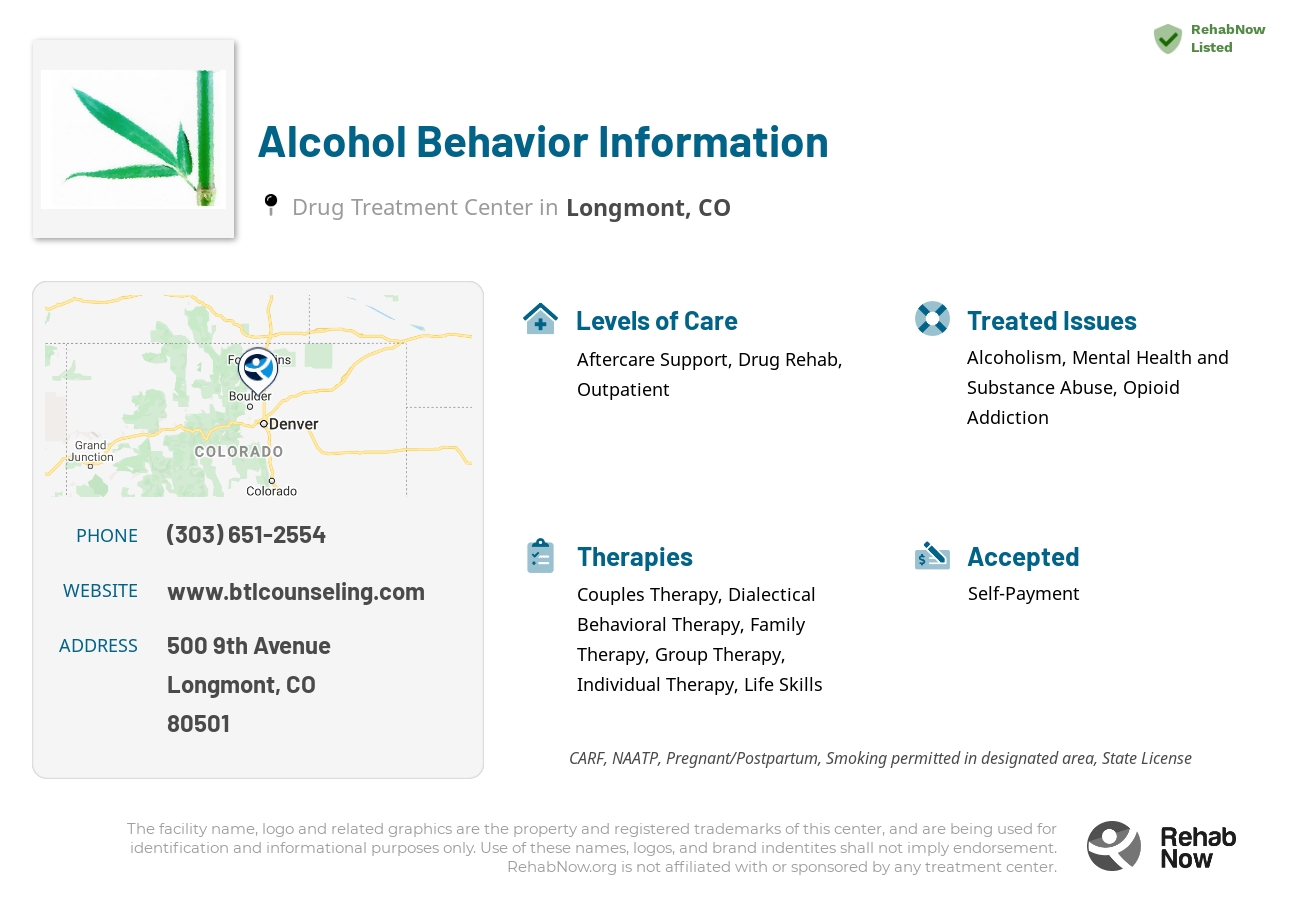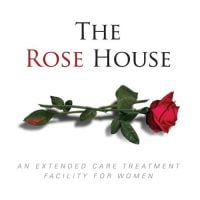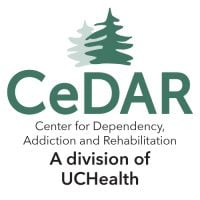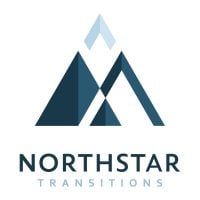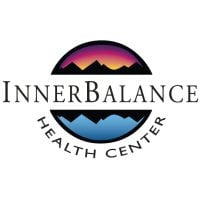Alcohol Behavior Information
Drug Rehab Center in Longmont, Colorado
Alcohol Behavior Information in Longmont, Colorado is an outpatient behavioral health center that offers evidence-based treatment and support for addiction and substance abuse, with a holistic approach combining individual counseling, group therapy, family involvement, and education, and a range of tailored services including counseling, trauma counseling, crisis intervention, and relapse prevention.
About Alcohol Behavior Information in Colorado
Alcohol Behavior Information in Longmont, Colorado is a comprehensive outpatient behavioral health center that offers a wide range of services for individuals struggling with addiction or substance abuse. The facility's team of specialized professionals provides evidence-based treatment and support from each step of the recovery journey. Their holistic approach combines individual counseling, group therapy, family involvement, and education to treat the physical, emotional, and spiritual aspects of addiction. The friendly and caring staff are committed to providing the highest quality care to support lasting recovery.
Alcohol Behavior Information offers a variety of services tailored to meet the individual needs of each client, such as individual and group counseling, trauma counseling, crisis intervention, and relapse prevention. They also provide educational programs to equip clients with the skills to manage their condition and lead a successful recovery. In addition, the team offers family counseling and support, helping to foster understanding and overcome the stigma of addiction. The center also accepts a broad range of insurance plans, so clients can access the care they need without financial difficulty.
Alcohol Behavior Information is accredited by several organizations, such as the Joint Commission and the Colorado Department of Human Services. The staff also hold several licenses and certifications, including Certified Addiction Counselors, Licensed Addiction Counselors, Certified Co-Occurring Disorders Counselors, and Certified Clinical Supervisors. Additionally, the staff are certified in several evidence-based practices and use a multidisciplinary approach to provide the most effective treatment plans. The center has received awards and recognition from the Longmont community, acknowledging their commitment to providing quality care.
Genders
Ages
Modality
Additional
Conditions and Issues Treated
Opioid addiction is a common form of addiction, often caused by prescription drugs that are abused. Addiction is treated by detoxifying the body and following up with therapies to correct behavior and target the root of the problem.
Most opioid addiction begins with patients being prescribed painkillers after an injury or surgery. The body becomes used to the chemicals in these medications and soon no longer responds to their presence. As a result, addicts seek out stronger opiate-based medications like Oxycodone to compensate for the lack of effectiveness.
The most dangerous aspect is that these addictive behaviors often get carried over onto illicit drugs like heroin, which are increasingly potent and result in lower life expectancies.
Levels of Care Offered
This center offers a variety of custom treatment tailored to individual recovery. Currently available are Aftercare Support, Drug Rehab, Outpatient, with additional therapies available as listed below.
Outpatient treatment programs are less intensive than an inpatient program. Participants live at home while working or going to school. Benefits include being able to continue relationships with family, friends, and work/studies. Treatment includes educating patient on addiction to drugs, medication, and counseling. Benefits include being able to continue relationships with family, friends, and work/studies. Treatment includes educating patient on addiction to drugs, medication, and counseling. Counseling sessions are for either individual or group.
Aftercare Support in drug rehab is crucial because it helps people stay sober after treatment. The benefits of Aftercare Support are that it provides a pathway that will help people get sober for life. It supports healing at all levels, physical, mental, emotional, and spiritual.
Therapies & Programs
Individualized Treatment is essential because it gives addicts the ability to participate in a program that meets their unique needs. An addict should work with professionals who understand what they’re going through, especially if the addict is actively using.
Trying to find a treatment program that meets your needs can be challenging. It’s even more complicated if you don’t know what kind of treatment you need. Being able to have professionals who are experienced with treating your situation is key to getting sober. Finding the right treatment program for an addict is difficult, but it’s even harder without communicating with those who have experience treating your specific situation.
Couples therapy is beneficial for couples in which at least one partner has a substance use disorder. This type of therapy can help partners improve communication skills, which is an important factor in a healthy relationship. It can also help partners better understand one another so they have a greater understanding of how the other partner may be feeling.
Benefits of couples therapy include:
- Improvement in communication skills
- Increased understanding of the dynamics within a relationship
- Increased sense of support and trust in the relationship
- Better teamwork between partners/increased willingness to listen and work together
- Enhanced tolerance of each other’s shortcomings
- Improved ability to have open, honest communication with each other
Family dysfunction can often be the underlying cause of substance abuse. To get sober, you need to find a different way to cope with the pain in your life. Family therapy can help you and your family deal with old issues that may trigger substance abuse. It will help everyone understand why each member of the family feels and acts the way they do. It can give everyone new tools to manage their emotions so that they don’t want to drink or do drugs.
A person looking for drug recovery should know that group therapy is an essential tool. Group therapy provides accountability and friendship to people with addiction. It is recommended as a lifetime treatment habit. Group therapy occurs in a group setting as opposed to a one-on-one setting. It benefits patients by providing a feeling of support and letting them know they are not alone. Patients at Alcohol Behavior Information also learn to build trust and understanding and gain perspective through discussions.
Dialectical behavior therapy is a type of cognitive-behavioral therapy that focuses on eliminating specific negative thoughts that can potentially lead to an individual inflicting self-harm. It helps treat patients exhibiting uncontrollable emotions, intense mood swings, and borderline personality disorders.
The term “dialectic” means the integration of opposites. In the substance abuse context, dialectical behavior therapy refers to accepting the patient’s addiction and changing their thoughts and behavior. It improves life skills such as controlling intense emotions without reacting impulsively, resolving interpersonal conflicts effectively, and promoting awareness about self and others.
Cognitive behavioral therapy (CBT) is a type of psychotherapeutic treatment that is focused on changing negative ways of thinking that contribute to addictive behavior.
Cognitive behavioral therapy is beneficial for:
- People who are seeking to overcome addictive behavior
- Those who struggle with addictive behavior and mental illness
- People who have a genetic history of addiction in their family
- Those who don’t want to depend on medications
- Those who need a more practical treatment approach
Life skills training is beneficial for addicts in recovery because it helps them learn how to take care of themselves and improve their quality of life, which can promote feelings of purpose and motivation.
This type of treatment works by teaching individuals life-enhancing skills that support positive living, including:
- Healthy lifestyle habits
- Skills to effectively manage stress
- Effective communication skills to help them get their needs met without turning to drugs or alcohol
- Money management and budgeting skills so they can continue to take care of themselves after treatment ends.
Payment Options Accepted
For specific insurance or payment methods please contact us.
Additional Details
Specifics, location, and helpful extra information.
Longmont, Colorado 80501 Phone Number(303) 651-2554 Meta DetailsUpdated November 25, 2023
Staff Verified
Alcohol Behavior Information Patient Reviews
There are no reviews yet. Be the first one to write one.
Longmont, Colorado Addiction Information
The Centennial State has slipped to a ranking of 12th in the country for drug abuse. Each year around 24% of the state's population uses illegal drugs while nearly 5% of its population abuses alcohol. Substance-related deaths in Colorado were responsible for 15.12% between 2008 and 2017. Fortunately, Colorado drug and alcohol addiction treatment are available to help a person overcome addiction.
The problem in Longmont, Colorado, is relatively bad. According to recent statistics, there are approximately 9,500 people who struggle with drug addiction in the city. This means that about 8% of the population is addicted to drugs. Almost 24% had used an illicit drug at some point. Many treatment centers offer specialized programs. It is important to find a treatment center that fits the individual's needs, as each person's situation is unique.
Treatment in Nearby Cities
- Evergreen, CO (39.1 mi.)
- Crawford, CO (168.2 mi.)
- Greeley, CO (26.9 mi.)
- Edgewater, CO (29.2 mi.)
- Lafayette, CO (12.5 mi.)
Centers near Alcohol Behavior Information
The facility name, logo and brand are the property and registered trademarks of Alcohol Behavior Information, and are being used for identification and informational purposes only. Use of these names, logos and brands shall not imply endorsement. RehabNow.org is not affiliated with or sponsored by Alcohol Behavior Information.


